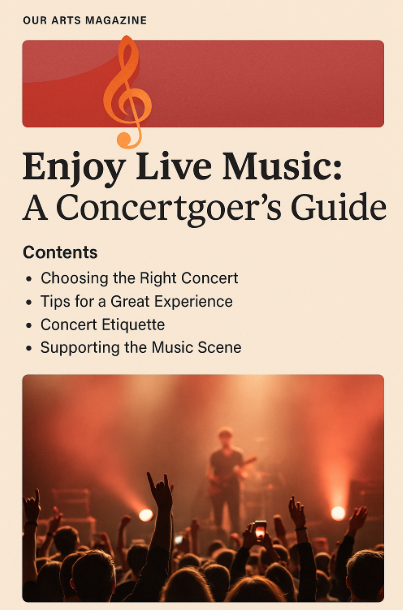A friendly, practical guide to enjoying live music together — without dampening anyone’s night.
Why Etiquette Still Matters
Live music is a shared space: artists perform, venues host, crews graft, and audiences create the atmosphere. Good etiquette is not about stuffiness; it is simply a compact that allows everyone to hear, see, and feel the music at its best. In small rooms, a single conversation can be louder than the quietest song; in large arenas, a thoughtless crowd surge can injure people. A little consideration makes the magic possible.
Before the Show: Preparation
- Tickets and times: Check your ticket and the venue’s site for door times, set times, and age restrictions. Arrive early enough to find your spot without pushing.
- What to bring: Photo ID if required, earplugs (highly recommended), a small bag, and a refillable water bottle if permitted. Avoid backpacks in crowded rooms.
- Dress code: Wear what you like, but think practical footwear and layers. Big hats and large headwear block views.
- Accessibility planning: If you or a friend need step-free access, seating, or a quiet space, contact the venue in advance. Many will accommodate if asked ahead of time.
During the Show: Best Behaviour
- See something, say something (kindly): If someone is pushed or spilled on, check they are all right. Alert staff if needed; do not escalate.
- Mind the view: Taller folks and people with big hair or hats — consider standing slightly to the side. If you lift someone onto shoulders, make sure there is space and you are not blocking others.
- Volume of conversation: Whisper during quiet songs or step back to the bar. Constant chatter belongs outside the room, not in front of the stage.
- Mosh pits & dancing: Participate only if you understand the etiquette: pick people up when they fall, no elbows, no targeting. Consent applies on the dancefloor too.
- Respect the crew: Bar staff, security, and engineers keep the night running. A “thank you” travels further than you think.
Phones, Photos, and Filming
We live in a phone-forward world, but screens can spoil sightlines and the vibe. As a rule of thumb:
- Follow the artist’s request: If the show is phone-free, respect it. Some artists allow photos for the first three songs only.
- Record briefly, not constantly: Capture a 10–20 second clip, then enjoy the moment. Do not hold your screen high for entire songs.
- Flash off, brightness down: Flashes blind performers and distract the audience. Lower your screen brightness.
- Tag kindly: If you share, credit the artist and venue. Avoid posting unflattering clips of strangers.
Accessibility & Inclusion
Inclusive gigs are better for everyone. Consider:
- Space and comfort: Offer your spot to someone who visibly needs it more. Keep aisles and ramps clear.
- Sensory considerations: Loud volumes and strobes affect some attendees. Earplugs help; warn neighbours if you are using a camera with a bright screen.
- Language and respect: Avoid slurs, sexist chants, or jokes at others’ expense. The music community thrives on welcome, not gatekeeping.
For Artists: Setting Expectations
Artists can shape audience behaviour before the first chord. A few small steps help enormously:
- Publish a simple policy: Add a sentence to your event pages about filming, phone use, and pit etiquette. Clarity prevents conflict.
- Work with the venue: Agree on signage, strobe warnings, and accessibility notes. Make sure front-of-house staff know your requests.
- Signal during the set: A quick, friendly reminder about phones or crowd safety can reset the room without killing the mood.
- Thank the crew publicly: Model the respect you wish to see. Your fans will follow your lead.
After the Show: Support the Scene
- Merch & music: If you can, buy directly from the artist. It is the most effective way to support their work.
- Leave a review: A short, specific review helps artists and venues alike. Mention sound quality, crowd vibe, and accessibility.
- Travel kindly: Be considerate to neighbours and public transport staff on the way home. Keep noise to a civil level.
Quick Glossary
- FOH
- Front of House — the staff working with the audience (bar, door, merch).
- Backline
- Shared onstage gear such as amps and drums provided by the venue or headliner.
- House left / right
- Directions from the audience’s perspective, useful when finding friends or exits.
Printable Checklist
- ✔ Check set times and ID requirements
- ✔ Bring earplugs and a small bag
- ✔ Plan access needs with the venue
- ✔ Keep conversations low during quiet songs
- ✔ Record short clips only; flash off
- ✔ Offer help if someone is in difficulty
- ✔ Buy merch or music if you can
- ✔ Leave a concise, courteous review
✍️ Submit a Guest Post
Not a member yet? You can still share your creative voice with our readers. We welcome guest posts from artists, writers, and creative souls of all kinds.
Submit Your ArticleShare this link with your friends if you enjoyed the post 🙂 See the share buttons below to your right

